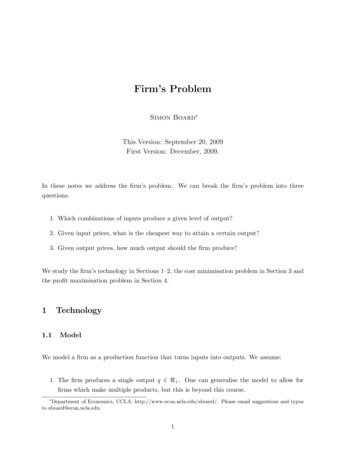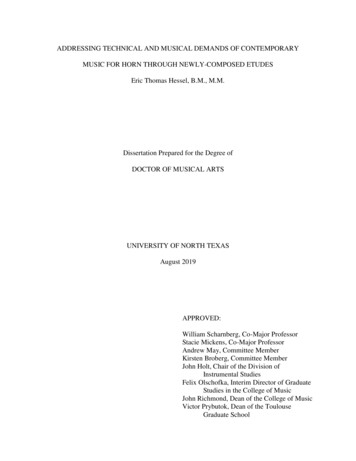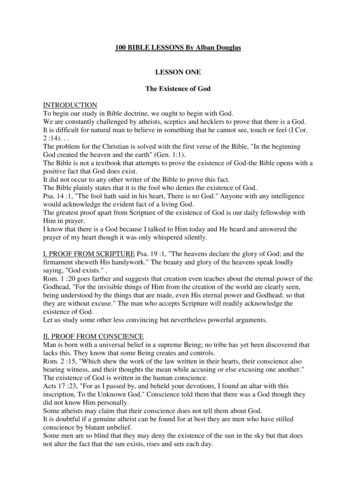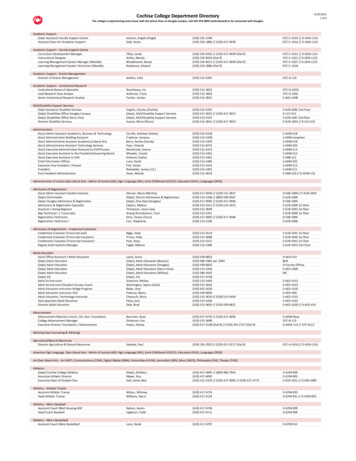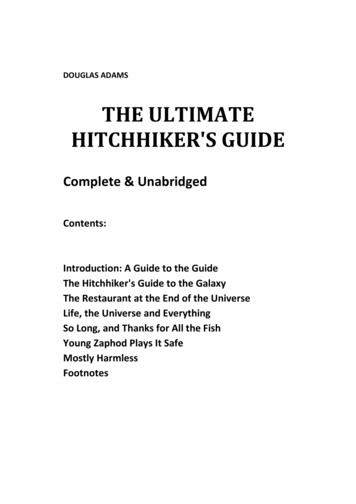
Transcription
DOUGLAS ADAMSTHE ULTIMATEHITCHHIKER'S GUIDEComplete & UnabridgedContents:Introduction: A Guide to the GuideThe Hitchhiker's Guide to the GalaxyThe Restaurant at the End of the UniverseLife, the Universe and EverythingSo Long, and Thanks for All the FishYoung Zaphod Plays It SafeMostly HarmlessFootnotes
Introduction: A GUIDE TOTHE GUIDESome unhelpful remarks from the authorThe history of The Hitchhiker's Guide to the Galaxy is now socomplicated that every time I tell it I contradict myself, and wheneverI do get it right I'm misquoted. So the publication of this omnibusedition seemed like a good opportunity to set the record straight ʹ orat least firmly crooked. Anything that is put down wrong here is, as faras I'm concerned, wrong for good.The idea for the title first cropped up while I was lying drunk in afield in Innsbruck, Austria, in 1971. Not particularly drunk, just thesort of drunk you get when you have a couple of stiff Gössers afternot having eaten for two days straight, on account of being apenniless hitchhiker. We are talking of a mild inability to stand up.I was traveling with a copy of the Hitch Hiker s Guide to Europe byKen Walsh, a very battered copy that I had borrowed from someone.In fact, since this was 1971 and I still have the book, it must count asstolen by now. I didn't have a copy of Europe on Five Dollars a Day (asit then was) because I wasn't in that financial league.Night was beginning to fall on my field as it spun lazily underneathme. I was wondering where I could go that was cheaper thanInnsbruck, revolved less and didn't do the sort of things to me thatInnsbruck had done to me that afternoon. What had happened wasthis. I had been walking through the town trying to find a particularaddress, and being thoroughly lost I stopped to ask for directionsfrom a man in the street. I knew this mightn't be easy because I don'tspeak German, but I was still surprised to discover just how muchdifficulty I was having communicating with this particular man.Gradually the truth dawned on me as we struggled in vain tounderstand each other that of all the people in Innsbruck I could havestopped to ask, the one I had picked did not speak English, did notspeak French and was also deaf and dumb. With a series of sincerelyapologetic hand movements, I disentangled myself, and a few
minutes later, on another street, I stopped and asked another manwho also turned out to be deaf and dumb, which was when I boughtthe beers.I ventured back onto the street. I tried again.When the third man I spoke to turned out to be deaf and dumband also blind I began to feel a terrible weight settling on myshoulders; wherever I looked the trees and buildings took on dark andmenacing aspects. I pulled my coat tightly around me and hurriedlurching down the street, whipped by a sudden gusting wind. Ibumped into someone and stammered an apology, but he was deafand dumb and unable to understand me. The sky loured. Thepavement seemed to tip and spin. If I hadn't happened then to duckdown a side street and pass a hotel where a convention for the deafwas being held, there is every chance that my mind would havecracked completely and I would have spent the rest of my life writingthe sort of books for which Kafka became famous and dribbling.As it is I went to lie in a field, along with my Hitch Hiker's Guide toEurope, and when the stars came out it occurred to me that if onlysomeone would write a Hitchhiker's Guide to the Galaxy as well, thenI for one would be off like a shot. Having had this thought I promptlyfell asleep and forgot about it for six years.I went to Cambridge University. I took a number of bathsʹand adegree in English. I worried a lot about girls and what had happenedto my bike. Later I became a writer and worked on a lot of things thatwere almost incredibly successful but in fact just failed to see the lightof day. Other writers will know what I mean.My pet project was to write something that would combinecomedy and science fiction, and it was this obsession that drove meinto deep debt and despair. No one was interested, except finally oneman a BBC radio producer named Simon Brett who had had the sameidea, comedy and science fiction. Although Simon only produced thefirst episode before leaving the BBC to concentrate on his own writing(he is best known in the United Stares for his excellent Charles Parisdetective novels), I owe him an immense debt of gratitude for simplygetting the thing to happen in the first place. He was succeeded bythe legendary Geoffrey Perkins.In its original form the show was going to be rather different. I wasfeeling a little disgruntled with the world at the time and had put
together about six different plots, each of which ended with thedestruction of the world in a different way, and for a different reason.It was to be called "The Ends of the Earth "While I was filling in the details of the first plot ʹ in which the Earthwas demolished to make way for a new hyperspace express route ʹ Irealized that I needed to have someone from another planet aroundto tell the reader what was going on, to give the story the context itneeded. So I had to work out who he was and what he was doing onthe Earth.I decided to call him Ford Prefect. (This was a joke that missedAmerican audiences entirely, of course, since they had never heard ofthe rather oddly named little car, and many thought it was a typingerror for Perfect.) I explained in the text that the minimal research myalien character had done before arriving on this planet had led him tothink that this name would be "nicely inconspicuous." He had simplymistaken the dominant life form.So how would such a mistake arise? I remembered when I used tohitchhike through Europe and would often find that the informationor advice that came my way was out of date or misleading in someway. Most of it, of course, just came from stories of other people'stravel experiences.At that point the title The Hitchhiker's Guide to the Galaxysuddenly popped back into my mind from wherever it had beenhiding all this time. Ford, I decided, would be a researcher whocollected data for the Guide. As soon as I started to develop thisparticular notion, it moved inexorably to the center of the story, andthe rest, as the creator of the original Ford Prefect would say, is bunk.The story grew in the most convoluted way, as many people will besurprised to learn. Writing episodically meant that when I finishedone episode I had no idea about what the next one would contain.When, in the twists and turns of the plot, some event suddenlyseemed to illuminate things that had gone before, I was as surprisedas anyone else.I think that the BBC's attitude toward the show while it was inproduction was very similar to that which Macbeth had towardmurdering people ʹ initial doubts, followed by cautious enthusiasmand then greater and greater alarm at the sheer scale of theundertaking and still no end in sight. Reports that Geoffrey and I and
the sound engineers were buried in a subterranean studio for weekson end, taking as long to produce a single sound effect as otherpeople took to produce an entire series (and stealing everybody else'sstudio time in which to do so), were all vigorously denied butabsolutely true.The budget of the series escalated to the point that it could havepractically paid for a few seconds of Dallas. If the show hadn'tworked.The first episode went out on BBC Radio 4 at 10 30 P.M. onWednesday, March 8, 1978, in a huge blaze of no publicity at all. Batsheard it. The odd dog barked.After a couple of weeks a letter or two trickled in. So ʹ someoneout there had listened. People I Balked to seemed to like Marvin theParanoid Android, whom I had written in as a one ʹ scene joke andhad only developed further at Geoffrey's insistence.Then some publishers became interested, and I was commissionedby Pan Books in England to write up the series in book form. After alot of procrastination and hiding and inventing excuses and havingbaths, I managed to get about two- ‐thirds of it done. At this point theysaid, very pleasantly and politely, that I had already passed tendeadlines, so would I please just finish the page I was on and let themhave the damn thing.Meanwhile, I was busy trying to write another series and was alsowriting and script editing the TV series "Dr. Who," because while itwas all very pleasant to have your own radio series, especially onethat somebody had written in to say they had heard, it didn't exactlybuy you lunch.So that was more or less the situation when the book TheHitchhiker's Guide to the Galaxy was published in England inSeptember 1979 and appeared on the Sunday Times mass marketbest- ‐seller list at number one and just stayed there. Clearly,somebody had been listening.This is where things start getting complicated, and this is what Iwas asked, in writing this Introduction, to explain. The Guide hasappeared in so many forms ʹ books, radio, a television series, recordsand soon to be a major motion picture ʹ each time with a differentstory line that even its most acute followers have become baffled attimes.
Here then is a breakdown of the different versions ʹ not includingthe various stage versions, which haven't been seen in the States andonly complicate the matter further.The radio series began in England in March 1978. The first seriesconsisted of six programs, or "fits" as they were called. Fits 1 thru 6.Easy. Later that year, one more episode was recorded and broadcast,commonly known as the Christmas episode. It contained no referenceof any kind to Christmas. It was called the Christmas episode becauseit was first broadcast on December 24, which is not Christmas Day.After this, things began to get increasingly complicated.In the fall of 1979, the first Hitchhiker book was published inEngland, called The Hitchhiker's Guide to the Galaxy. It was asubstantially expanded version of the first four episodes of the radioseries, in which some of the characters behaved in entirely differentways and others behaved in exactly the same ways but for entirelydifferent reasons, which amounts to the same thing but savesrewriting the dialogue.At roughly the same time a double record album was released,which was, by contrast, a slightly contracted version of the first fourepisodes of the radio series. These were not the recordings that wereoriginally broadcast but wholly new recordings of substantially thesame scripts. This was done because we had used music offgramophone records as incidental music for the series, which is fineon radio, but makes commercial release impossible.In January 1980, five new episodes of "The Hitchhiker's Guide tothe Galaxy" were broadcast on BBC Radio, all in one week, bringingthe total number to twelve episodes.In the fall of 1980, the second Hitchhiker book was published inEngland, around the same time that Harmony Books published thefirst book in the United States. It was a very substantially reworked,reedited and contracted version of episodes 7, 8, 9, 10, 11, 12, S and 6(in that order) of the radio series "The Hitchhiker's Guide to theGalaxy." In case that seemed too straightforward, the book was calledThe Restaurant at the End of the Universe, because it included thematerial from radio episodes of "The Hitchhiker's Guide to theGalaxy," which was set in a restaurant called Milliways, otherwiseknown as the Restaurant at the End of the Universe.
At roughly the same time, a second record album was madefeaturing a heavily rewritten and expanded version of episodes 5 and6 of the radio series. This record album was also called The Restaurantat the End of the Universe.Meanwhile, a series of six television episodes of "The Hitchhiker'sGuide to the Galaxy" was made by the BBC and broadcast in January1981. This was based, more or less, on the first six episodes of theradio series. In other words, it incorporated most of the book TheHitchhiker's Guide to the Galaxy and the second half of the book TheRestaurant at be End of the Universe. Therefore, though it followedthe basic structure of the radio series, it incorporated revisions fromthe books, which didn't.In January 1982 Harmony Books published The Restaurant at theEnd of the Universe in the United States.In the summer of 1982, a third Hitchhiker book was publishedsimultaneously in England and the United States, called Life, theUniverse and Everything. This was not based on anything that hadalready been heard or seen on radio or television. In fact it flatlycontradicted episodes 7, 8, 9, 10, I 1 and 12 of the radio series. Theseepisodes of "The Hitchhiker's Guide to the Galaxy," you willremember, had already been incorporated in revised form in the bookcalled The Restaurant at the End of the Universe.At this point I went to America to write a film screenplay which wascompletely inconsistent with most of what has gone on so far, andsince that film was then delayed in the making (a rumor currently hasit that filming will start shortly before the Last Trump), I wrote afourth and last book in the trilogy, So Long, and Thanks for All the Fish.This was published in Britain and the USA in the fall of 1984 and iteffectively contradicted everything to date, up to and including itself.As if this all were not enough I wrote a computer game for Infocomcalled The Hitchhiker's Guide to the Galaxy, which bore only fleetingresemblances to anything that had previously gone under that title,and in collaboration with Geoffrey Perkins assembled The Hitchhiker sGuide to the Galaxy: The Original Radio Scripts (published in Englandand the USA in 1985). Now this was an interesting venture. The bookis, as the title suggests, a collection of all the radio scripts, asbroadcast, and it is therefore the only example of one Hitchhikerpublication accurately and consistently reflecting another. I feel a
little uncomfortable with this ʹ which is why the introduction to thatbook was written after the final and definitive one you are nowreading and, of course, flatly contradicts it.People often ask me how they can leave the planet, so I haveprepared some brief notes.How to Leave the PlanetI. Phone NASA. Their phone number is (713) 483- ‐3111. Explain thatit's very important that you get away as soon as possible.2. If they do not cooperate, phone any friend you may have in theWhite House- ‐(202) 456- ‐1414- ‐to have a word on your behalf with theguys at NASA.3. If you don't have any friends in the White House, phone theKremlin (ask the overseas operator for 0107- ‐095- ‐295- ‐9051). Theydon't have any friends there either (at least, none to speak of), butthey do seem to have a little influence, so you may as well try.4. If that also fails, phone the Pope for guidance. His telephonenumber is 011- ‐39- ‐6- ‐6982, and I gather his switchboard is infallible.5. If all these attempts fail, flag down a passing flying saucer andexplain that de's vitally important you get away before your phone billarrives.Douglas AdamsLos Angeles 1983 andLondon 1985/1986
DOUGLAS ADAMSTHE HITCHHIKER'S GUIDE TOTHE GALAXYFor Jonny Brock and Clare Gorstand all other Arlingtoniansfor tea, sympathy, and a sofa
PrefaceFar out in the uncharted backwaters of the unfashionable end ofthe western spiral arm of the Galaxy lies a small unregarded yellowsun.Orbiting this at a distance of roughly ninety- ‐two million miles is anutterly insignificant little blue green planet whose ape- ‐descended lifeforms are so amazingly primitive that they still think digital watchesare a pretty neat idea.This planet has ʹ or rather had ʹ a problem, which was this: mostof the people on it were unhappy for pretty much of the time. Manysolutions were suggested for this problem, but most of these werelargely concerned with the movements of small green pieces of paper,which is odd because on the whole it wasn't the small green pieces ofpaper that were unhappy.And so the problem remained; lots of the people were mean, andmost of them were miserable, even the ones with digital watches.Many were increasingly of the opinion that they'd all made a bigmistake in coming down from the trees in the first place. And somesaid that even the trees had been a bad move, and that no one shouldever have left the oceans.And then, one Thursday, nearly two thousand years after one manhad been nailed to a tree for saying how great it would be to be niceto people for a change, one girl sitting on her own in a small cafe inRickmansworth suddenly realized what it was that had been goingwrong all this time, and she finally knew how the world could bemade a good and happy place. This time it was right, it would work,and no one would have to get nailed to anything.Sadly, however, before she could get to a phone to tell anyoneabout it, a terribly stupid catastrophe occurred, and the idea was lostforever.This is not her story.
But it is the story of that terrible stupid catastrophe and some of itsconsequences.It is also the story of a book, a book called The Hitch Hiker's Guideto the Galaxy ʹ not an Earth book, never published on Earth, and untilthe terrible catastrophe occurred, never seen or heard of by anyEarthman.Nevertheless, a wholly remarkable book.In fact it was probably the most remarkable book ever to come outof the great publishing houses of Ursa Minor ʹ of which no Earthmanhad ever heard either.Not only is it a wholly remarkable book, it is also a highly successfulone ʹ more popular than the Celestial Home Care Omnibus, betterselling than Fifty More Things to do in Zero Gravity, and morecontroversial than Oolon Colluphid's trilogy of philosophicalblockbusters Where God Went Wrong, Some More of God's GreatestMistakes and Who is this God Person Anyway?In many of the more relaxed civilizations on the Outer Eastern Rimof the Galaxy, the Hitch Hiker's Guide has already supplanted thegreat Encyclopedia Galactica as the standard repository of allknowledge and wisdom, for though it has many omissions andcontains much that is apocryphal, or at least wildly inaccurate, itscores over the older, more pedestrian work in two importantrespects.First, it is slightly cheaper; and secondly it has the words DON'TPANIC inscribed in large friendly letters on its cover.But the story of this terrible, stupid Thursday, the story of itsextraordinary consequences, and the story of how theseconsequences are inextricably intertwined with this remarkable bookbegins very simply.It begins with a house.
Chapter 1The house stood on a slight rise just on the edge of the village. Itstood on its own and looked over a broad spread of West Countryfarmland. Not a remarkable house by any means ʹ it was about thirtyyears old, squattish, squarish, made of brick, and had four windowsset in the front of a size and proportion which more or less exactlyfailed to please the eye.The only person for whom the house was in any way special wasArthur Dent, and that was only because it happened to be the one helived in. He had lived in it for about three years, ever since he hadmoved out of London because it made him nervous and irritable. Hewas about thirty as well, dark haired and never quite at ease withhimself. The thing that used to worry him most was the fact thatpeople always used to ask him what he was looking so worried about.He worked in local radio which he always used to tell his friends was alot more interesting than they probably thought. It was, too ʹ most ofhis friends worked in advertising.It hadn't properly registered with Arthur that the council wanted toknock down his house and build an bypass instead.At eight o'clock on Thursday morning Arthur didn't feel very good.He woke up blearily, got up, wandered blearily round his room,opened a window, saw a bulldozer, found his slippers, and stompedoff to the bathroom to wash.Toothpaste on the brush ʹ so. Scrub.Shaving mirror ʹ pointing at the ceiling. He adjusted it. For amoment it reflected a second bulldozer through the bathroomwindow. Properly adjusted, it reflected Arthur Dent's bristles. Heshaved them off, washed, dried, and stomped off to the kitchen tofind something pleasant to put in his mouth.Kettle, plug, fridge, milk, coffee. Yawn.The word bulldozer wandered through his mind for a moment insearch of something to connect with.
The bulldozer outside the kitchen window was quite a big one.He stared at it."Yellow," he thought and stomped off back to his bedroom to getdressed.Passing the bathroom he stopped to drink a large glass of water,and another. He began to suspect that he was hung over. Why was hehung over? Had he been drinking the night before? He supposed thathe must have been. He caught a glint in the shaving mirror. "Yellow,"he thought and stomped on to the bedroom.He stood and thought. The pub, he thought. Oh dear, the pub. Hevaguely remembered being angry, angry about something thatseemed important. He'd been telling people about it, telling peopleabout it at great length, he rather suspected: his clearest visualrecollection was of glazed looks on other people's faces. Somethingabout a new bypass he had just found out about. It had been in thepipeline for months only no one seemed to have known about it.Ridiculous. He took a swig of water. It would sort itself out, he'ddecided, no one wanted a bypass, the council didn't have a leg tostand on. It would sort itself out.God what a terrible hangover it had earned him though. He lookedat himself in the wardrobe mirror. He stuck out his tongue. "Yellow,"he thought. The word yellow wandered through his mind in search ofsomething to connect with.Fifteen seconds later he was out of the house and lying in front of abig yellow bulldozer that was advancing up his garden path.Mr. L Prosser was, as they say, only human. In other words he wasa carbon- ‐based life form descended from an ape. More specifically hewas forty, fat and shabby and worked for the local council. Curiouslyenough, though he didn't know it, he was also a direct male- ‐linedescendant of Genghis Khan, though intervening generations andracial mixing had so juggled his genes that he had no discernibleMongoloid characteristics, and the only vestiges left in Mr. L Prosserof his mighty ancestry were a pronounced stoutness about the tumand a predilection for little fur hats.He was by no means a great warrior: in fact he was a nervousworried man. Today he was particularly nervous and worried because
something had gone seriously wrong with his job ʹ which was to seethat Arthur Dent's house got cleared out of the way before the daywas out."Come off it, Mr. Dent,", he said, "you can't win you know. Youcan't lie in front of the bulldozer indefinitely." He tried to make hiseyes blaze fiercely but they just wouldn't do it.Arthur lay in the mud and squelched at him."I'm game," he said, "we'll see who rusts first.""I'm afraid you're going to have to accept it," said Mr. Prossergripping his fur hat and rolling it round the top of his head, "thisbypass has got to be built and it's going to be built!""First I've heard of it," said Arthur, "why's it going to be built?"Mr. Prosser shook his finger at him for a bit, then stopped and putit away again."What do you mean, why's it got to be built?" he said. "It's a bypass.You've got to build bypasses."Bypasses are devices which allow some people to drive from pointA to point B very fast whilst other people dash from point B to point Avery fast. People living at point C, being a point directly in between,are often given to wonder what's so great about point A that so manypeople of point B are so keen to get there, and what's so great aboutpoint B that so many people of point A are so keen to get there. Theyoften wish that people would just once and for all work out where thehell they wanted to be.Mr. Prosser wanted to be at point D. Point D wasn't anywhere inparticular, it was just any convenient point a very long way frompoints A, B and C. He would have a nice little cottage at point D, withaxes over the door, and spend a pleasant amount of time at point E,which would be the nearest pub to point D. His wife of course wantedclimbing roses, but he wanted axes. He didn't know why ʹ he justliked axes. He flushed hotly under the derisive grins of the bulldozerdrivers.He shifted his weight from foot to foot, but it was equallyuncomfortable on each. Obviously somebody had been appallinglyincompetent and he hoped to God it wasn't him.Mr. Prosser said: "You were quite entitled to make any suggestionsor protests at the appropriate time you know."
"Appropriate time?" hooted Arthur. "Appropriate time? The first Iknew about it was when a workman arrived at my home yesterday. Iasked him if he'd come to clean the windows and he said no he'dcome to demolish the house. He didn't tell me straight away of course.Oh no. First he wiped a couple of windows and charged me a fiver.Then he told me.""But Mr. Dent, the plans have been available in the local planningoffice for the last nine month.""Oh yes, well as soon as I heard I went straight round to see them,yesterday afternoon. You hadn't exactly gone out of your way to callattention to them had you? I mean like actually telling anybody oranything.""But the plans were on display.""On display? I eventually had to go down to the cellar to findthem.""That's the display department.""With a torch.""Ah, well the lights had probably gone.""So had the stairs.""But look, you found the notice didn't you?""Yes," said Arthur, "yes I did. It was on display in the bottom of alocked filing cabinet stuck in a disused lavatory with a sign on thedoor saying Beware of the Leopard."A cloud passed overhead. It cast a shadow over Arthur Dent as helay propped up on his elbow in the cold mud. It cast a
Herethen!is!a!breakdown!of!thedifferentversions ! t!notincluding! theva rious!stageversions,which!haven'tbeen!s






